Altona, Victoria
| Altona Melbourne, Victoria | |||||||||||||||
|---|---|---|---|---|---|---|---|---|---|---|---|---|---|---|---|
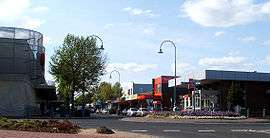 Main street of Altona | |||||||||||||||
 Altona | |||||||||||||||
| Coordinates | 37°52′05″S 144°49′48″E / 37.868°S 144.830°ECoordinates: 37°52′05″S 144°49′48″E / 37.868°S 144.830°E | ||||||||||||||
| Population | 10,762 (2016)[1] | ||||||||||||||
| • Density | 636.8/km2 (1,649/sq mi) | ||||||||||||||
| Postcode(s) | 3018 | ||||||||||||||
| Area | 16.9 km2 (6.5 sq mi) | ||||||||||||||
| Location | 13 km (8 mi) from Melbourne | ||||||||||||||
| LGA(s) | City of Hobsons Bay | ||||||||||||||
| State electorate(s) | Altona | ||||||||||||||
| Federal Division(s) | Gellibrand | ||||||||||||||
| |||||||||||||||
Altona is a suburb of Melbourne, Victoria, Australia, 13 km south-west of Melbourne's Central Business District,[2][3][4] located within the City of Hobsons Bay local government area. Altona recorded a population of 10,762 at the 2016 census.
Altona is a large suburb consisting of low density residential in the south-eastern half, with mixed industry in the north-western half. A key feature is Altona Beach on Port Phillip, which is one of only two swimming beaches in the western suburbs (the other being Williamstown Beach).
Altona takes its name from the then independent German city of Altona[5] which is today a borough of Hamburg.
History
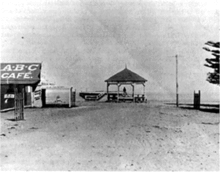
Prior to arrival of Europeans, the Altona area was home to Kurung-Jang-Balluk Aboriginal people, of the Woiwurrung clan.
Altona was first permanently settled in 1842, with the construction of The Homestead by Alfred Langhorne. The name 'Altona' first appeared on maps in 1861.[5] It was named by Frederick Taegtow, a German who hailed from Altona, then a town just outside of Hamburg.[6] Taegtow believed that coal was to be found in the area, and in 1881 he formed the Williamstown (Taegtow) Prospecting Company.[5] From 1886 housing in the Altona and Merton Street estates was sold, and by 1901 the Victorian Government owned an explosives reserve in the west of Altona.
On 20 February 1911 J J Hammond flew the first cross country flight between towns in Australia from Altona Bay to Geelong in Victoria, and on 23 February, also at Altona Bay in Victoria, he undertook the first powered passenger flight in Australia.[7]
Coal mining formed the basis of the local economy from 1908 to 1919; however, this was brought to an end in 1930 when open cut mining was developed in the Latrobe Valley.
By 1918 the population was sufficient to justify a Post Office which opened on 14 January 1918.[8]
Similar to the rest of Melbourne, following the Second World War Altona embraced a large influx of immigrants, primarily from the Mediterranean, Central Europe and a smaller number from the Middle East.
From 1862 Altona was a town in the Shire of Werribee, but in 1957, the Altona Riding of the Shire, which included Altona itself as well as Altona North and Altona Meadows, was annexed, and became the City of Altona in 1968.[9] This was merged into the City of Hobsons Bay in June 1994 under local government amalgamations undertaken by the Kennett government.
Politics
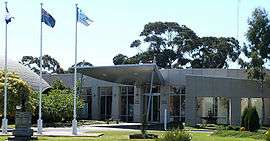
On 24 June 2010, Altona became home to Australia's first female Prime Minister, Julia Gillard, a then resident of Altona. Gillard was voted in by the governing Australian Labor Party to replace Kevin Rudd as its leader, making her Australia's 27th Prime Minister.[10]
Population
In the 2016 Census, there were 10,762 people in Altona. 64.6% of people were born in Australia. The next most common countries of birth were England 4.8%, New Zealand 2.3%, Malta 2.1%, India 1.7% and Italy 1.6%. 73.3% of people only spoke English at home. Other languages spoken at home included Italian 2.3%, Maltese 2.2%, Mandarin 1.7%, Vietnamese 1.3% and Greek 1.3%. The most common responses for religion in were No Religion 33.2%, Catholic 30.5% and Anglican 8.9%.[1]
Parks and gardens
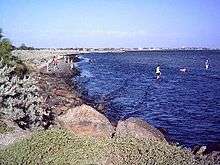
Altona has many significant parks and gardens, including some important environmental conservation areas and wetlands along the shores of Port Phillip. These are also used by visitors and residents recreationally, including a long promenade along the bay. Notable areas include:
Education
Altona has four primary schools consisting of Altona Primary School, Seaholme Primary School, Altona College (a recent merger between the former Altona Secondary College and Altona West Primary School) and St. Marys Catholic Primary School. The secondary schools include Mount St. Joseph Girls' College and Altona College (Altona Secondary College changed its name in 2007).
Altona has a library branch, which contains the Environmental Resources Centre. This centre provides the community access to media concerning the environmental initiatives of Hobsons Bay, including Industry Environment Improvement Plans from local industry.
Culture
The Altona Beach Festival is a free event held annually at the Logan Reserve precinct, (located on the Esplanade and includes the Logan Reserve parklands, part of Pier Street and the Esplanade), to promote and celebrate Hobsons Bay and the western suburbs. It involves various activities, including a twilight street parade, beach market, double-decker bus tour, professional entertainers, RAAF fly-overs and fireworks off the Altona Pier.
The Altona Beach Festival was previously known as the Bayside Festival and also Operation Recreation, and some residents still refer to it by one of these names. The 30th anniversary of the festival was held in 2007. It enjoyed a brief period of heightened prominence in 2002 when it was featured on the Channel 9 travel program Postcards in a segment hosted by Geoff Cox. The festival is easily accessed by buses and suburban passenger trains as it is just a few minutes walk away from Altona Station. Scouts Australia is a major feature of the parade and the many community activities that take place close to the beautiful beach front.
The Altona City Theatre is a production company based in the Altona Civic Theatre, producing two major musicals and a smaller pantomime annually. The pantomime coincides with the Bayside Festival and was originally intended as an outlet for young directors.
Scouts Australia has two groups in Altona. The 1st Altona Scout Group runs from the Scout Hall. The 4th Altona Scout Group are located at the Pines, an old camp owned by the City of Hobsons Bay.
Sport
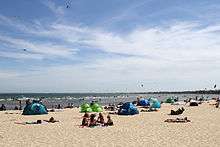
Altona is home to many sporting clubs including Australian rules football, soccer, hockey, basketball, cricket and lacrosse. Melbourne Ballpark is a baseball complex in the west of Altona.
Altona is represented by many teams, including the soccer team Altona Magic currently competing in the Victorian State League Division 1, which is the third tier in Australia behind the A-League and the Victorian Premier League. Altona City SC plays in Victorian State League Division 2 N/W.
The suburb has an Australian Rules football team competing in the Western Region Football League.[11]
The Altona Roosters are the local Victorian Rugby League team, whose home ground is Loft Reserve, in neighbouring Newport.
Golfers play at the course of the Kooringal Golf Club on Wilga Avenue.[12]
Additionally, the area of the beach directly west of Altona Pier is one of Melbourne's most popular spots for kitesurfing.
Transport
There are three railway stations in Altona; Altona, Westona and Seaholme, each of which is on the Altona loop line which runs between Altona Junction on the Werribee railway line and Laverton railway station. During weekdays, the loop line is served by a service running between Laverton and the city. At weekends all rail services to and from Werribee run via the loop line.
Bus routes 411, 412, 415 and 903 also service the area.
The Hobsons Bay Coastal Trail is a shared path for cyclists and pedestrians, which follows the coast through Altona. This is linked to a path which loops around Cherry Lake. Most major roads have on-road cycleways.
Industry
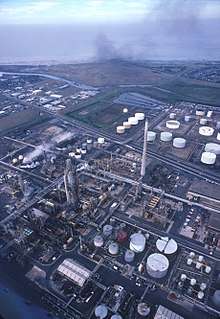
Local industry includes petrochemical storage, manufacturing and distribution. The Altona Petrochemical Complex was established in the early 1960s, utilising feedstocks from the nearby Altona Refinery, and later the Bass Strait gas fields, to produce a wide range of products for the chemical and plastics industry.[13] The complex grew to become the largest petrochemical installation in the southern hemisphere and included major global chemical companies such as Dow Chemicals, Union Carbide, Hoechst, BF Goodrich and BASF.[14] This was a major environmental concern to residents in the 1970s and 1980s; however, strict environmental controls and local projects involving industry, government and environmental groups have reduced these concerns, cleaning up coastal areas that were once neglected.[15]
Just outside Altona is the Toyota Australia Altona Plant. It is at this plant that Camrys and Aurions are built, with 80% of the cars produced at this plant being for the world market. The plant was closed in 2017.
Notable residents
- Julia Gillard – was an Altona resident while serving as Australia's 27th Prime Minister
See also
- Altona Beach
- Altona Meadows
- Altona North
- City of Altona - Altona was previously within this former local government area.
References
- 1 2 Australian Bureau of Statistics (27 June 2017). "Altona (State Suburb)". 2016 Census QuickStats. Retrieved 21 July 2017.

- ↑ "Oil Painting". Melbourne: The Age. 7 January 2006. Archived from the original on 12 May 2009. Retrieved 5 June 2009.
- ↑ "Altona". totaltravel.com. Archived from the original on 27 March 2009. Retrieved 5 June 2009.
- ↑ "Altona, Victoria". Australian Places. Monash University. Archived from the original on 25 August 2006. Retrieved 25 July 2013.
- 1 2 3 Kennedy, B: Australian Place Names, page 5. ABC Books, 2006
- ↑ "Mining". Altona Homestead. Altona Laverton Historical Society Inc. Retrieved 25 February 2018.
- ↑ Australian National Aviation Museum. "Aviation in Australia". Australian National Aviation Museum. Archived from the original on 13 September 2007. Retrieved 15 September 2007.
- ↑ Premier Postal History. "Post Office List". Retrieved 11 April 2008.
- ↑ Victorian Municipal Directory. Brunswick: Arnall & Jackson. 1992. p. 282. Accessed at State Library of Victoria, La Trobe Reading Room.
- ↑ "New PM". Archived from the original on 29 June 2010. Retrieved 24 June 2010.
- ↑ Full Points Footy. "Altona". Retrieved 15 April 2009.
- ↑ Golf Select. "Kooringal". Retrieved 11 May 2009.
- ↑ Smith, Ailie (13 April 2000). "Altona Petrochemical Complex (c. 1961 - )". Encyclopaedia of Australian Science. Retrieved 9 July 2017.
- ↑ "The petrochemical complex at Altona". Technology in Australia 1788-1988. Australian Science and Technology Heritage Centre. 2000. Retrieved 9 July 2017.
- ↑ Harding, Nessie. "THE ALTONA CHEMICAL COMPLEX NEIGHBOURHOOD CONSULTATIVE GROUP" (PDF). Qenos. Retrieved 9 July 2017.
External links
| Wikimedia Commons has media related to Altona, Victoria. |